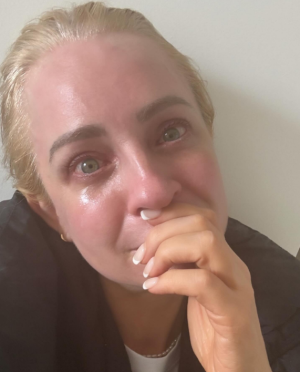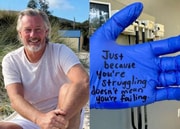TV presenter's raw confession on antidepressants reshapes views on mental health
By
Gian T
- Replies 0
In a world where attention is often drawn to polished moments, it takes courage to reveal the unseen struggles behind the scenes.
A well-known voice in Australian media recently opened up about personal challenges, shedding light on an issue that often goes unspoken.
Through an honest conversation on national radio, they offered a rare glimpse into the complexities of mental health, resonating with many who face similar battles.
During a heartfelt segment on her national HIT radio show, Carrie Bickmore shared with her co-host Tommy Little and her listeners that she has begun taking antidepressants for the first time.
This revelation came as she admitted to grappling with persistent sadness, describing her days as being 'sad all the time.'
'I shared a picture to my Instagram on Friday that I didn’t really think much of when I shared it, and I didn’t realise how many people themselves would benefit from seeing it,' she said.
The catalyst for her candid disclosure was an Instagram post that resonated deeply with her followers.
'I came across a photo that I had sent my friend, who had asked me a few months ago, "Was I having a good day or a bad day?" because she knew I was having a really tough time,' Bickmore continued.
'I was on the floor, leaning against the wall on the carpet, and I was in the middle of crying.'
'I took a photo, sent it back and said not a good one. '
Bickmore recounted how she had stumbled upon a photo she had taken during a particularly challenging moment.
The image, which captured her in the midst of tears, was initially sent to a friend in response to a simple inquiry about her day.
Moved by the outpouring of support and identification from her audience, she decided to make the private struggle public.
Bickmore's decision to share her experience is a powerful reminder that mental health issues do not discriminate.
They can affect anyone, regardless of their status or success.
Her openness about seeking help, including seeing a psychologist and starting medication, is a testament to the importance of acknowledging when we need support and taking steps to get it.
The radio host's journey highlights a critical issue facing many Australians: the difficulty in accessing mental health professionals due to long wait times.
Despite this challenge, Bickmore has been proactive in her approach, incorporating exercise into her routine, even on days when it feels like an insurmountable task.
'I have started taking antidepressants for the first time in my entire life and, not that I had anything against them, I just had been able to manage before, but it got to the point where I realised I can’t do it on my own anymore and I need a helping hand,' she said.
Her honesty about the ups and downs of her mental health journey, including the acknowledgment that 'some days just suck,' has struck a chord with many.
'The reaction I had to that picture reminded me that days suck for a lot of people.' Bickmore continued.
'My [direct messages] have been full of people ranging from just a bad day at work, a fight with a partner, all the way to tragic things.'
'It’s incredible perspective when you share something like that.'
'It’s heartbreaking but a reminder you are not alone. Everyone has their stuff.'
The overwhelming response to her shared photo and story underscores a universal truth: everyone has their battles, and no one is truly alone in their struggles.
The impact of Bickmore's admission extends beyond her own experiences. It serves as a beacon of hope and solidarity for those silently suffering, encouraging them to reach out and seek help.
Her message is clear: It's okay not to be okay and to need and ask for help.
As we reflect on Bickmore's brave disclosure, it's essential to consider how we, as a society, can better support those around us who may be facing similar challenges.
Let's take a moment to check in on our friends, family, and even acquaintances, offering a listening ear or a helping hand.
Let's also advocate for improved access to mental health services, ensuring that everyone who needs help can receive it promptly.
Carrie Bickmore's raw confession is more than just a personal story; it's a call to action for all of us to be more compassionate, understanding, and supportive of mental health issues.
By sharing her journey, she has opened up a conversation that can potentially change lives and, perhaps, save them.
It's a poignant reminder that behind every public figure is a private individual with challenges and that sharing our vulnerabilities can foster a more empathetic and connected community.

Credit: Instagram

We invite you to share your thoughts and experiences with mental health in the comments below. Your story could be the one that inspires someone else to seek the help they need. Remember, you are not alone, and together, we can continue to build a community of support and understanding.
A well-known voice in Australian media recently opened up about personal challenges, shedding light on an issue that often goes unspoken.
Through an honest conversation on national radio, they offered a rare glimpse into the complexities of mental health, resonating with many who face similar battles.
During a heartfelt segment on her national HIT radio show, Carrie Bickmore shared with her co-host Tommy Little and her listeners that she has begun taking antidepressants for the first time.
This revelation came as she admitted to grappling with persistent sadness, describing her days as being 'sad all the time.'
'I shared a picture to my Instagram on Friday that I didn’t really think much of when I shared it, and I didn’t realise how many people themselves would benefit from seeing it,' she said.
The catalyst for her candid disclosure was an Instagram post that resonated deeply with her followers.
'I came across a photo that I had sent my friend, who had asked me a few months ago, "Was I having a good day or a bad day?" because she knew I was having a really tough time,' Bickmore continued.
'I was on the floor, leaning against the wall on the carpet, and I was in the middle of crying.'
'I took a photo, sent it back and said not a good one. '
Bickmore recounted how she had stumbled upon a photo she had taken during a particularly challenging moment.
The image, which captured her in the midst of tears, was initially sent to a friend in response to a simple inquiry about her day.
Moved by the outpouring of support and identification from her audience, she decided to make the private struggle public.
Bickmore's decision to share her experience is a powerful reminder that mental health issues do not discriminate.
They can affect anyone, regardless of their status or success.
Her openness about seeking help, including seeing a psychologist and starting medication, is a testament to the importance of acknowledging when we need support and taking steps to get it.
The radio host's journey highlights a critical issue facing many Australians: the difficulty in accessing mental health professionals due to long wait times.
Despite this challenge, Bickmore has been proactive in her approach, incorporating exercise into her routine, even on days when it feels like an insurmountable task.
'I have started taking antidepressants for the first time in my entire life and, not that I had anything against them, I just had been able to manage before, but it got to the point where I realised I can’t do it on my own anymore and I need a helping hand,' she said.
Her honesty about the ups and downs of her mental health journey, including the acknowledgment that 'some days just suck,' has struck a chord with many.
'The reaction I had to that picture reminded me that days suck for a lot of people.' Bickmore continued.
'My [direct messages] have been full of people ranging from just a bad day at work, a fight with a partner, all the way to tragic things.'
'It’s incredible perspective when you share something like that.'
'It’s heartbreaking but a reminder you are not alone. Everyone has their stuff.'
The overwhelming response to her shared photo and story underscores a universal truth: everyone has their battles, and no one is truly alone in their struggles.
The impact of Bickmore's admission extends beyond her own experiences. It serves as a beacon of hope and solidarity for those silently suffering, encouraging them to reach out and seek help.
Her message is clear: It's okay not to be okay and to need and ask for help.
As we reflect on Bickmore's brave disclosure, it's essential to consider how we, as a society, can better support those around us who may be facing similar challenges.
Let's take a moment to check in on our friends, family, and even acquaintances, offering a listening ear or a helping hand.
Let's also advocate for improved access to mental health services, ensuring that everyone who needs help can receive it promptly.
Carrie Bickmore's raw confession is more than just a personal story; it's a call to action for all of us to be more compassionate, understanding, and supportive of mental health issues.
By sharing her journey, she has opened up a conversation that can potentially change lives and, perhaps, save them.
It's a poignant reminder that behind every public figure is a private individual with challenges and that sharing our vulnerabilities can foster a more empathetic and connected community.
Tip
Support is available if you or someone you know is struggling. You can reach out to Lifeline at 13 11 14. Young people seeking help can contact Beyond Blue at 1300 22 4636 or visit Headspace at headspace.org.au. You're not alone—help is just a call or click away.
Credit: Instagram
Key Takeaways
- Radio host Carrie Bickmore has revealed she is taking antidepressants for the first time in her life due to ongoing mental health challenges.
- Bickmore shared her experience with her listeners on her HIT radio show, stating she feels she has 'sad days all the time' and has been finding things hard in her personal life.
- She has received counselling from a psychologist, is trying to incorporate exercise into her life, and decided to take medication, which has made a 'massive difference' to her.
- Her open and honest admission about her mental health struggles has resonated with many people, leading to an outpouring of support and similar stories shared by fans and listeners.








